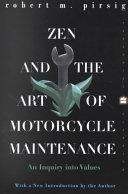Source: Zen and the Art of Motorcycle Maintenance (1974), Ch. 29
Context: What is essential to understand at this point is that until now there was no such thing as mind and matter, subject and object, form and substance. Those divisions are just dialectical inventions that came later. The modern mind sometimes tends to balk at the thought of these dichotomies being inventions and says, "Well, the divisions were there for the Greeks to discover," and you have to say, "Where were they? Point to them!" And the modern mind gets a little confused and wonders what this is all about anyway, and still believes the divisions were there.
But they weren't, as Phædrus said. They are just ghosts, immortal gods of the modern mythos which appear to us to be real because we are in that mythos. But in reality they are just as much an artistic creation as the anthropomorphic Gods they replaced.
Quotes from book
Zen and the Art of Motorcycle Maintenance

Zen and the Art of Motorcycle Maintenance: An Inquiry into Values , by Robert M. Pirsig, is a book that was first published in 1974. It is a work of fictionalized autobiography, and is the first of Pirsig's texts in which he explores his Metaphysics of Quality.
Variant: To live only for some future goal is shallow. It's the sides of the mountain that sustain life, not the top.
Source: Zen and the Art of Motorcycle Maintenance (1974), Ch. 17
Context: Mountains should be climbed with as little effort as possible and without desire. The reality of your own nature should determine the speed. If you become restless, speed up. If you become winded, slow down. You climb the mountain in an equilibrium between restlessness and exhaustion. Then, when you are no longer thinking ahead, each footstep isn't just a means to an an end but a unique event in itself. This leaf has jagged edges. This rock looks loose. From this place the snow is less visible, even though closer. These are things you should notice anyway. To live only for some future goal is shallow. It’s the sides of the mountain that sustain life, not the top. Here's where things grow. <!-- p. 205
“The pencil is mightier than the pen.”
Source: Zen and the Art of Motorcycle Maintenance: An Inquiry Into Values
“For every fact there is an infinity of hypotheses.”
Source: Zen and the Art of Motorcycle Maintenance: An Inquiry Into Values
“The more you look, the more you see.”
Variant: The more you read, the more you calm down.
Source: Zen and the Art of Motorcycle Maintenance
“The only Zen you find on tops of mountains is the Zen you bring there.”
Source: Zen and the Art of Motorcycle Maintenance (1974), Ch. 20
Context: Zen is the "spirit of the valley." The only Zen you find on the tops of mountains is the Zen you bring up there.
“Absence of Quality is the essence of squareness.”
Source: Zen and the Art of Motorcycle Maintenance: An Inquiry Into Values
“What is good, Phædrus, and what is not good—need we ask anyone to tell us these things?”
Source: Zen and the Art of Motorcycle Maintenance (1974), Ch. 30
The quote is from section 258d of the dialogue Phædrus (tr. Benjamin Jowett).
Source: Zen and the Art of Motorcycle Maintenance: An Inquiry Into Values
Context: A single thought begins to grow in his mind, extracted from something he read in the dialogue Phædrus. "And what is written well and what is written badly—need we ask Lysias, or any other poet or orator, who ever wrote or will write either a political or any other work, in metre or out of metre, poet or prose writer, to teach us this?"
What is good, Phædrus, and what is not good—need we ask anyone to tell us these things?